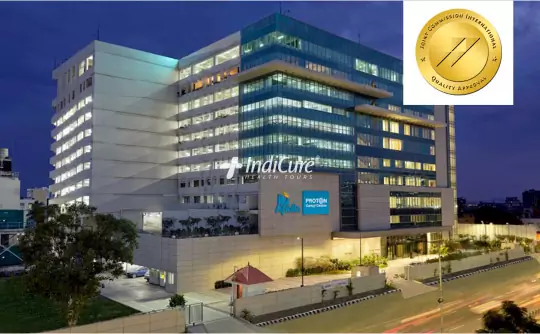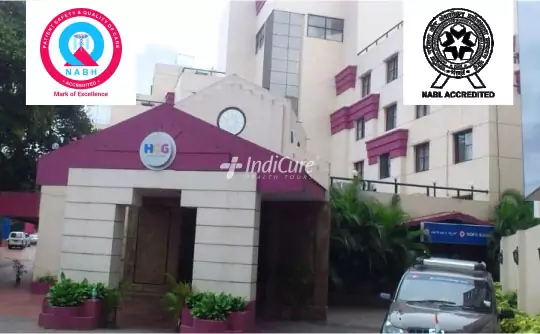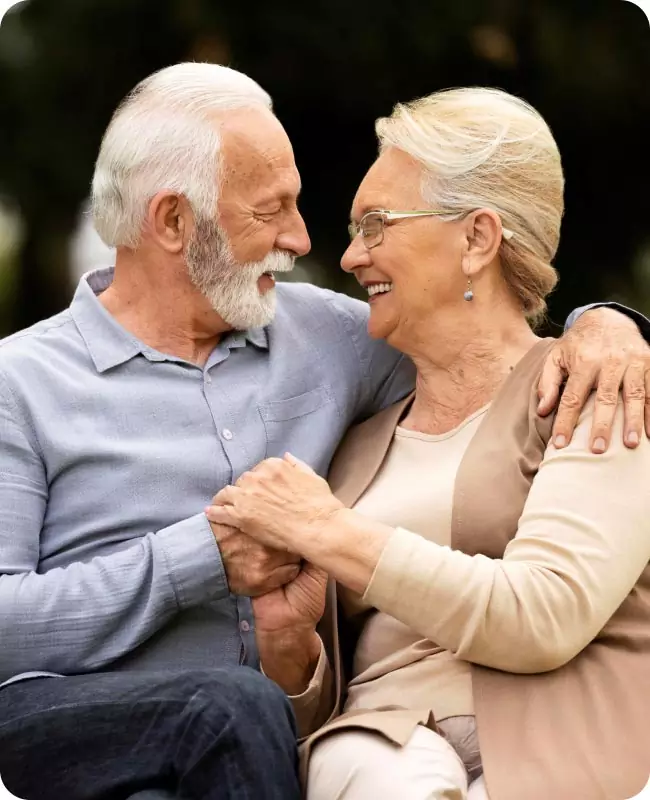

Targeted Therapy Cost in India starts from US $1,900 and can go upto around US $3500. The cost of targeted therapy in India varies depending on your medical history and health condition, drugs used in targeted therapy, area and stage of the cancer you are suffering from, your treating doctor's seniority and experience, hospital and the city where you choose to get the treatment done.
In fact, we have Special Negotiated Rates with the Hospitals and you can avail Discounted Rates when you choose to Travel with IndiCure.


We Help you Choose the Right Treatment, Surgeon & Hospital

We Arrange Video/Telephonic Consultation with the Surgeon

We Assist you with Visa & Accommodation

We Receive you at the Airport and Drop you at Hotel/Hospital

We Assist you the at Hospital & Provide Post Operative Support

Chennai
The Apollo Proton Cancer Centre (APCC) is South Asia's and the Middle East's first and only proton therapy centre, as well as India's first JCI-accredited cancer hospital. The APCC includes a completely integrated treatment suite that provides the most advanced surgical, radiation, and medical procedures available. The Centre brings together a remarkable team of clinicians renowned globally in cancer care, in keeping with the Apollo Pillars of Expertise and Excellence.

Bangalore
HCG- HealthCare Global Enterprises Ltd, is the specialized chain of hospitals in cancer care headquartered in Bangalore. Founded by Dr. Ajaikumar, a renowned medical and radiation oncologist with 40 years of experience, HCG has 26 centres across India with its largest facility in Bangalore.
HCG Hospital Bangalore is not only the most advanced facility for cancer care in India, it is a Centre of Excellence for most advanced cancer care and research.
Targeted therapy is a type of cancer treatment that relies on the genetic changes or mutations that cause healthy cells to become cancerous. Healthcare providers test for genetic abnormalities that enable cancer cells to grow and survive in order to use targeted therapy. Then they find precise medicines to destroy or stop certain cells from multiplying.
Targeted therapy allows doctors to treat cancer cells while avoiding harming healthy cells. More than 80 targeted medicines have been developed by healthcare practitioners to treat a variety of cancers. Targeted therapy is sometimes used as a first-line or initial treatment. They may also use targeted therapy in conjunction with other therapies.
Healthcare practitioners can identify specific cancer cell components to target for treatment after they understand the genetic mutation that turns a healthy cell into a cancer cell. These are sometimes targets on the surfaces of cancer cells. Occasionally, the targets are chemicals found within cancer cells. The below are two most prevalent types of targeted therapies and how they work to treat cancer:
are small enough to enter cancer cells and kill them. These medicines bind to specific targets on cancer cells and stop them from growing or killing them. Small molecule medications are easily identifiable since their generic names finish in "-ib." Imatinib (Gleevec), for example, is used to treat chronic myelogenous leukemia (CML) and other cancers by preventing tumor cells from receiving signals that tell them to develop.
are too big to get into cells. Instead, they attack targets on the outside of cells or right around them. They are cloned replicas of your antibodies generated in a lab. Antibodies are a component of the immune system. They're proteins that search your body for intruder proteins (antigens), which can come from infections or cancer cells. Antibodies attack these antigens in order to eliminate the invaders.
They're sometimes used to deliver chemo and radiation directly to the cancer cells. In a hospital or clinic, you normally get them through an IV in a vein in your arm.
More than 80 targeted medicines have been developed by healthcare practitioners to treat a variety of cancers. They've also created tailored medicines to tackle distinct mutations that are associated with the same type of cancer. Targeted therapy may be used to treat the following forms of cancer:
Some cancers, such as CML, virtually always have a target on which treatment can be focused. Your doctor may, however, need to test your tumor to discover if it contains any targets. They may do a biopsy, which involves taking a small sample of the tumor and analyzing it in a lab.
Even if you have the same form of cancer as someone else, the target may be different. HER2-positive breast tumors are not all the same. If you have the KRAS gene mutation, targeted colon cancer drugs such cetuximab (Erbitux) will not work.
You may need to try other therapies before your doctor offers a targeted therapy. Targeted therapy is frequently used in conjunction with other treatments.
We at IndiCure completely understand your concerns and it is always our endeavor to provide the best outcome for every patient. Following is the list of questions you must ask before you embark on your journey for targeted therapy in India.
Prepare to answer questions about your:

Because each person's condition is unique, ask your doctor to describe your treatment plan so you know what to expect. Here's some general facts about what to expect during targeted therapy:
Targeted therapy is a highly effective treatment, although it does not always work. Finding a therapeutic target is a difficult process that necessitates healthcare providers gathering a lot of information about cancer. It's a difficult procedure, and healthcare practitioners are still figuring out how to make it work better.
Chemotherapy has traditionally been used to treat cancer (developed in the 1940s). Chemotherapy works by destroying all of the body's rapidly dividing cells. Cancer cells divide quickly, causing them to be damaged and killed, while normal cells are spared.
Unfortunately, many normal body cells divide rapidly as well (such as blood cells, hair cells and intestine cells). As a result, chemotherapy frequently causes more serious side effects.
Targeted therapy is an anticancer treatment that targets a specific genetic mutation seen in a particular tumor. If chemotherapy is like a bomb, tailored therapy is like a sniper gun with pinpoint accuracy. Targeted therapies have much less adverse effects since the aberration targeted by these medications is particularly specific to cancer cells.
Chemotherapy and targeted therapy are two approaches to cancer treatment. There is no such thing as "better" or "worse." Chemotherapy and targeted therapy are frequently used in the treatment of cancer.
Targeted therapy may be used instead of chemotherapy in some types of cancers. Targeted treatment is not effective in all cancers. Targeted therapy or chemotherapy may be employed in some cases, and the choice of therapy is based on the patient's preferences.
The main advantage of targeted therapy is that it can eliminate cancer cells without harming healthy cells. It also has the ability to stop cancer cells from developing. When other treatments have failed, healthcare experts may propose targeted therapies.
Cancer cells require blood supply to grow beyond a small size (1-2 mm).
Angiogenesis is the process by which cancer cells establish their own blood supply. This process can be targeted with a variety of medicines that deprive tumors of blood supply, causing them to die. Anti-angiogenic medications are what they're called. Bevacizumab (also known as avastin), pazopanib (also known as votrient), sunitinib (also known as sutent), sorafenib, axitinib, regorafenib, and others are some instances.
Antiangiogenic therapy cannot be used to treat all types of cancers. The suitability of your cancer should be discussed with your medical oncologist.
Targeted therapy has different side effects than chemotherapy. Hair loss and low blood counts, for example, are infrequent side effects of targeted therapy.
Targeted therapies, on the other hand, are associated with side effects such as fatigue, skin rash, diarrhea, liver function abnormalities, changes in hands and feet, hypertension, and so on. The side effects of various targeted therapy vary. Your oncologist can advise you on the potential side effects of your treatment.
No, that is not the case. Despite the fact that targeted therapy is frequently safer than chemotherapy, significant adverse effects can sometimes occur. The choice of which therapy to utilize is influenced by a number of circumstances and should always be discussed between the patient and the doctor.
As previously said, targeted therapy is usually safe, convenient, and simple to administer. Chemotherapy, hormone therapy, and immunotherapy are among the many cancer treatment options accessible in the modern day.
If you don't want to receive targeted therapy, talk to your oncologist about other possibilities. However, no treatment is without adverse effects, and these treatments are not available for all cancers.
Throughout your treatment, you may experience adverse effects. The side effects of target therapy differ from individual to person. The majority of negative effects from targeted therapy fade away after a few months of treatment.
For many people, targeted therapy is an effective cancer treatment. Targeted therapy has a wide range of success rates. The outcome is determined by the type and stage of cancer.
Enhance your medical journey to India by availing these extra services.
Traveling abroad for medical reasons may be challenging. With our experience of over a decade and working with the best surgeons and top hospitals in India, we help make your medical tour easier and safer for you. We will guide you at every step of the way and make end-to-end arrangements for your surgery, travel, and stay.
Ramandeep Dhaliwal
I had great experience having rhinoplasty through Indicure. Dr. Ruchika from Indicure has helped me in finding best plastic surgeon, answering all my questions...
Read More
Joshua Archer
My name is Joshua Archer I'm from New Zealand, bay of plenty, kawerau I opted for the bypass surgery in January 2023 but planned it in advance for 28 September found IndiCure...
Read More
Kera Ren
Absolutely loved my experience with IndiCure - from first inquiring to meeting the surgeon pre op to my follow up post op. The surgeon was extremely approachable...
Read More
Andreana Paul
Had a wonderful experience. Visited India for my plastic surgery. From sending mails, airport pickup, comfortable accommodation and, to smooth hospital appointment booking...
Read More
Brandi Luce
I had the privilege of using Indicure's services for a cosmetic procedure that I had wanted for a long time but had always been apprehensive about. Ruchika helped me...
Read More
Jade M
Indicure Health Tours went above and beyond my expectations. They helped me with every aspect of my journey and were professional, kind and caring. I was...
Read More
The content on the website (www.indicure.com) is intended to be general information and is provided only as a service. All photographs on our website of before and after results are examples only, and do not constitute an implied or any other kind of certainty for the result of surgery.
Learn about IndiCure Health Tours' comprehensive editorial policy that strives to deliver trustworthy, helpful, relevant, accurate and people-first content on medical tourism in India.
It is not medical advice and should not be taken as medical advice. It should not be used to diagnose or treat a health condition and is in no way meant to be a substitute for professional medical care. You are advised to see a surgeon in person to assess what surgery may or may not accomplish for you.
It is also important to keep your expectations realistic and to understand that all surgical procedures carry risks and should never be taken lightly.